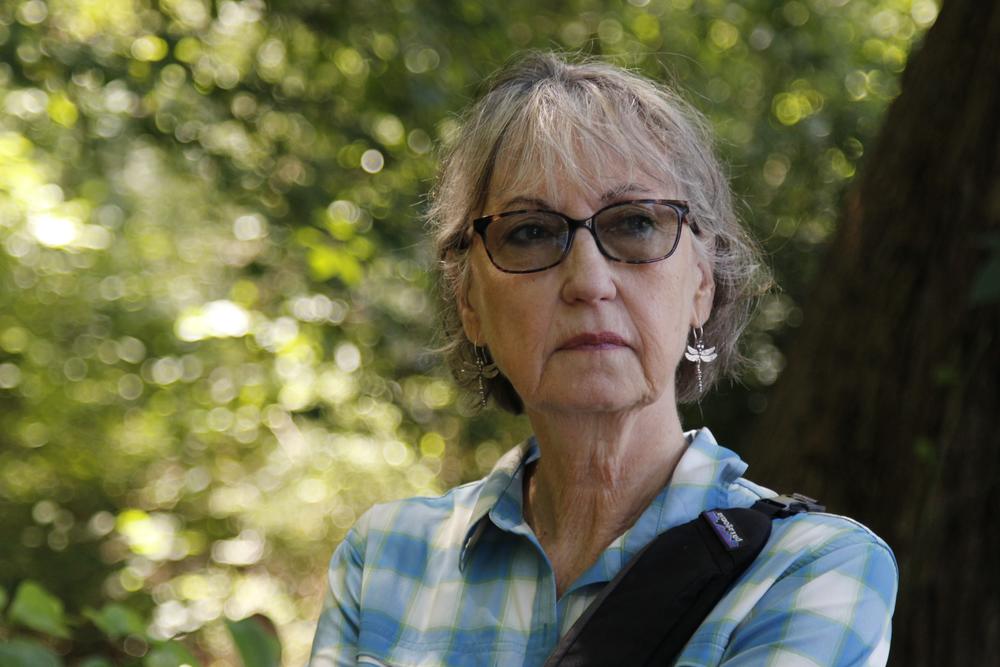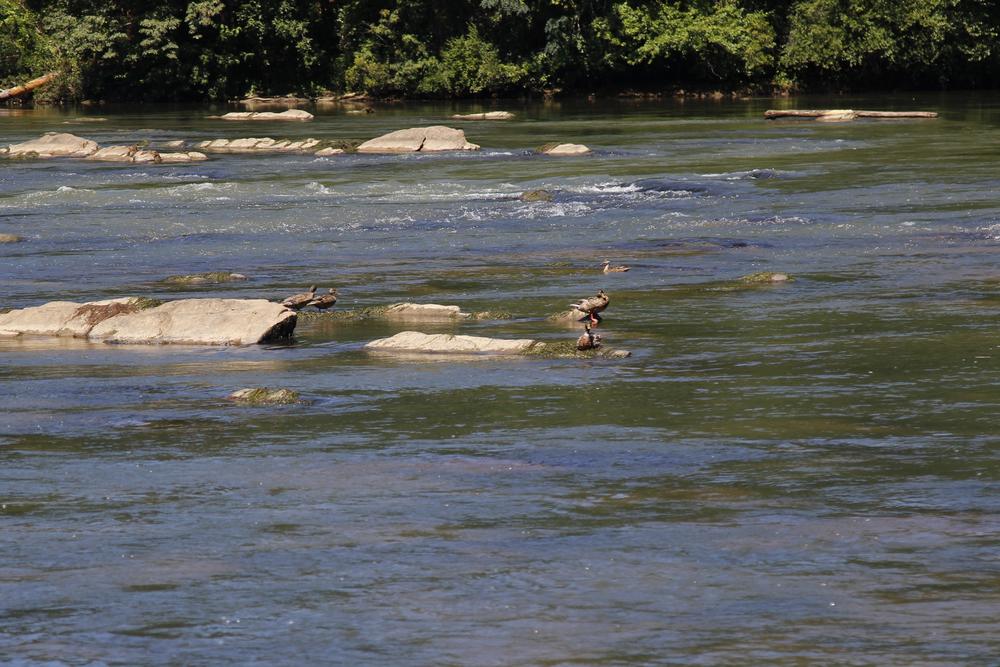
Caption
Sally Sierer Bethea is a retired riverkeeper and author of the new book, "Keeping the Chattahoochee".
Credit: Peter Biello
|Updated: July 13, 2023 2:58 PM
LISTEN: GPB's Peter Biello speaks with Sally Bethea about her new book, "Keeping the Chattahoochee."

Sally Sierer Bethea is a retired riverkeeper and author of the new book, "Keeping the Chattahoochee".
The Chattahoochee River is an essential part of the state’s ecosystem. Running from the North Georgia mountains all the way to Florida and the Gulf of Mexico, its river basin straddles three states and sustains more than 5 million people in the metro Atlanta area alone. It’s also sensitive to drought and vulnerable to contamination.
Riverkeepers have been fighting for three decades to maintain its health and push for policies that protect it. Sally Bethea served as riverkeeper for two decades before she retired in 2014, and her new book, Keeping the Chattahoochee is part-love letter to the river, part call-to-action for those who want to protect it. Recently she spoke about her work with GPB’s Peter Biello at the banks of the Chattahoochee.
Sally Bethea: Today, the river is fairly low because you can see all the rocks poking out. The river itself, where the fast-moving water is in the middle there — I mean, that's the center of the flow. And we see some ducks enjoying the sunshine and the water, clean water. So fabulous.
Peter Biello: The only perspective I've had on the river so far has been driving over it on the highways.
Sally Bethea: Most people look down — "oh, there's the river" and it's either like, "Oh, it looks good today" or "Ooh, it's muddy" because it rained. One thing in the book and in all of riverkeepers' work that we've focused on is emphasizing the connectivity and helping people think about [and] visualize where the river starts on this little, tiny spring and how it travels 546 miles down to the Gulf of Mexico [and] ends up with a different name, the Apalachicola. But it's the same water.
Peter Biello: You wrote this book to help people understand the river. I wanted to ask you to explain why it's important to understand it, especially if someone never sees it, except when they're driving over it on the highway. Or maybe if they live miles and miles away from it. Why is it important to understand the river?
Sally Bethea: Rivers are essential to our lives in so many ways, as we know that each one of us is 60% water. And this river here sustains 5 million people, at least, with drinking water and so much more. So there's the aspect of self-interest. You know, where does my water come from? And I wanted to write a book that helps explain that.
Peter Biello: You write in this book about the watershed for the metro Atlanta area. I'm not going to get the wording exactly right, but it was something about it being relatively small for the size of the metro area. And I'm wondering if that's alarming to you? So many people depending on a relatively small watershed when compared to other cities.

Ducks swim in the Chattahoochee River.
Sally Bethea: I do worry about the fact that we have such a small watershed, and we have a metropolitan area focused like laser on keeping as much water in Lake Lanier upstream to allow Atlanta intakes to function during droughts. That's when the problem is, during droughts. But I wonder about all the communities, people and ecosystem downstream. You know, we've got to figure out a way to share, to equitably share this river. Given the geography, the geology that we have, it's what we've got. And so working together is key. And that's tough when it comes down, particularly, to moneyed interests.
Peter Biello: The second part of that question had to do with growth and the growth in the Atlanta area. The population here is expected to increase quite a bit. Is the Chattahoochee watershed prepared for that? And if not, I mean, what happens to communities downstream, Columbus, you know, all the way down to Florida?
Sally Bethea: We, in the recent years, we've had a lot of rain and people seem to forget what it was like back in 2006 to 2009 when we had an exceptional drought. That will happen again. Now, many decision makers, leaders at all levels have tried to put together some plans to better deal with that eventuality, but they have still not come to a result, an outcome that I think will ensure everyone up and downstream is adequately protected, including the river itself. A lot of partisanship — of course, this river basin straddles three states. So you've got fights — Alabama, you've got Georgia, you've got Florida. And we have the capacity to be more careful with our water and more thoughtful. And I'm seeing metro leaders slipping back on some of the really good measures they made in the last, let's say, 10 to 12 years. There's a complacency again. You know, you've got a drought, people work to preserve, protect the water. And then you've got a lot of water? People forget about it.
Peter Biello: We heard recently about a bacterial contamination in the Chattahoochee. And anyone who reads your book will learn that this is far from the first time something has contaminated the water. There have been sewage spills, untreated wastewater. You write about witnessing a spill yourself. What does it take to heal a river when something like that happens? Is it all human intervention? Does the river to some extent heal itself over time? What happens in the healing process?
Sally Bethea: Rivers are amazingly resilient if you don't overuse and abuse them too much. If you're looking at bacterial pollution, untreated sewage going into a river, that bacteria will die within three or four days. It's looking for warm-bodied mammals to live in, and cold rivers are not where the bacteria like to live. So you stop the sewage spill and, you know, the river is going to take care of that. What we've seen recently was an ongoing — a chronic problem with Fulton County's Big Creek sewage plant. They're still trying to figure out what happened there. So with bacterial contamination, you stop the source. The river can, for the most part, heal itself. When you're talking about toxic chemicals, things even like DDT and chlordane, which have been banned for decades and decades, they're still persisting in the fish tissue, in some of the fish in this river. You can't just magically clean things like that up.
Peter Biello: So is there a concern that this river may get something dumped in it that just makes it beyond healing for human use?
Sally Bethea: No, that's not going to happen to the Chattahoochee River, I don't think. We're not going to let that happen.
Peter Biello: You're retired as riverkeeper in 2014. You've been an informal adviser to your colleagues who are still caring for the river since then. You've been writing. You've got this book out. Is there any one thing in your career that you feel has made the biggest impact on the health of this river?
Sally Bethea: You know, I mean, I think the biggest impact on the river and it's not just me, but it's the small group of people who started the organization Chattahoochee Riverkeeper. I feel like the growth of that organization, the fact that it is still thriving to this day, it is still helping speak truth to power, monitor the river, helping people enjoy the beauty of the river. And we're just one riverkeeper or river organization. But in my life, for this river, I think creating and help sustaining that organization is what I look back on as my biggest impact.
Peter Biello: Well, Sally Bethea, the book is Keeping the Chattahoochee. Thank you so much for taking me to the river. And thanks for speaking with me.
Sally Bethea: Thank you so much. I really appreciate it.